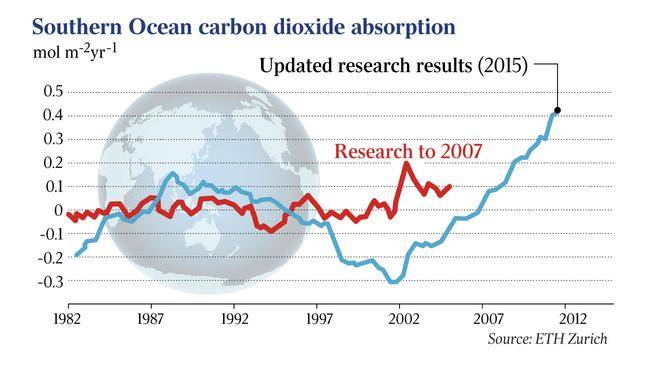And --- I'm kinda doubting at this point about any clear headed scientist being terrified. There are a couple dozen "activists" that led the charge to TERRIFY the public and political establishment, but I don't think that they actually believe many of the LEAPS to conclusions that they've pushed since the 80s. And thus --- THEY are not even "terrified".. The days of "shock and awe" for the GW crazy train are way behind us. NOW -- we gotta do the real work...
And --- I'm kinda doubting at this point about any clear headed scientist being terrified. There are a couple dozen "activists" that led the charge to TERRIFY the public and political establishment, but I don't think that they actually believe many of the LEAPS to conclusions that they've pushed since the 80s. And thus --- THEY are not even "terrified".. The days of "shock and awe" for the GW crazy train are way behind us. NOW -- we gotta do the real work...
You don't have to languish in your doubt. You can pretty much see scientists giving grave warnings about these feedback loops and thresholds everywhere you look. Scientists don't typically use the flowery, bombastic language of politicians or message board pundits, so these grave warnings are about as urgent and hyperbolic in their language as you are going to get from scientists attempting to speak formally.
Seems to me that Climate Scientists are a less arrogant than they were 20 years ago. They are not now revising the latest estimates of the temperature anomaly in 2100 MONTHLY --- like they were in the 80s and 90s. And MOST of the 50 and 100 years predictions have been constantly revised DOWN since the 80s. That doesn't indicate to ME -- an INCREASING level of personal anxiety..
When was the latest GUESS at the temperature anomaly in 2100? I haven't seen a single serious one for years now..
Either you have not been looking or you are a liar.
Four degrees and beyond: the potential for a global temperature increase of four degrees and its implications
Mark New, Diana Liverman, Heike Schroder, Kevin Anderson
Published 29 November 2010.DOI: 10.1098/rsta.2010.0303
Abstract
The 1992 UN Framework Convention on Climate Change commits signatories to preventing ‘dangerous anthropogenic interference with the climate system’, leaving unspecified the level of global warming that is dangerous. In the late 1990s, a limit of 2°C global warming above preindustrial temperature was proposed as a ‘guard rail’ below which most of the dangerous climate impacts could be avoided. The 2009 Copenhagen Accord recognized the scientific view ‘that the increase in global temperature should be below 2 degrees Celsius’ despite growing views that this might be too high. At the same time, the continued rise in greenhouse gas emissions in the past decade and the delays in a comprehensive global emissions reduction agreement have made achieving this target extremely difficult, arguably impossible, raising the likelihood of global temperature rises of 3°C or 4°C within this century. Yet, there are few studies that assess the potential impacts and consequences of a warming of 4°C or greater in a systematic manner. Papers in this themed issue provide an initial picture of the challenges facing a world that warms by 4°C or more, and the difficulties ahead if warming is to be limited to 2°C with any reasonable certainty. Across many sectors—coastal cities, agriculture, water stress, ecosystems, migration—the impacts and adaptation challenges at 4°C will be larger than at 2°C. In some cases, such as farming in sub-Saharan Africa, a +4°C warming could result in the collapse of systems or require transformational adaptation out of systems, as we understand them today. The potential severity of impacts and the behavioural, institutional, societal and economic challenges involved in coping with these impacts argue for renewed efforts to reduce emissions, using all available mechanisms, to minimize the chances of high-end climate change. Yet at the same time, there is a need for accelerated and focused research that improves understanding of how the climate system might behave under a +4°C warming, what the impacts of such changes might be and how best to adapt to what would be unprecedented changes in the world we live in.
| Philosophical Transactions of the Royal Society of London A: Mathematical, Physical and Engineering Sciences
The challenge to keep global warming below 2 °C
Glen P. Peters, Robbie M. Andrew, Tom Boden, Josep G. Canadell, Philippe Ciais, Corinne Le Quéré, Gregg Marland, Michael R. Raupach and Charlie Wilson
The latest carbon dioxide emissions continue to track the high end of emission scenarios, making it even less likely global warming will stay below 2 °C. A shift to a 2 °C pathway requires immediate significant and sustained global mitigation, with a probable reliance on net negative emissions in the longer term.
The challenge to keep global warming below 2 ?C - ProQuest
Atmospheric CO2 concentrations during ancient greenhouse climates were similar to those predicted for A.D. 2100
Abstract
Quantifying atmospheric CO2 concentrations ([CO2]atm) during Earth’s ancient greenhouse episodes is essential for accurately predicting the response of future climate to elevated CO2 levels. Empirical estimates of [CO2]atm during Paleozoic and Mesozoic greenhouse climates are based primarily on the carbon isotope composition of calcium carbonate in fossil soils. We report that greenhouse [CO2]atm have been significantly overestimated because previously assumed soil CO2 concentrations during carbonate formation are too high. More accurate [CO2]atm, resulting from better constraints on soil CO2, indicate that large (1,000s of ppmV) fluctuations in [CO2]atm did not characterize ancient climates and that past greenhouse climates were accompanied by concentrations similar to those projected for A.D. 2100.
Atmospheric CO2 concentrations during ancient greenhouse climates were similar to those predicted for A.D. 2100
One reason you are not seeing many new articles on the increase in temperature for 2100 is that the subject has been pretty well explored in light of present knowledge. That said, there are some large unknowns. Outgassing of the permafrost, methane eruptions from the ocean clathrates, or an increase in anthropogenic sources can all change that equation in a very negative manner.





 Thank you for finding that NASA "space math" just validated my assertion that the ACCELERATION is negligible.
Thank you for finding that NASA "space math" just validated my assertion that the ACCELERATION is negligible.